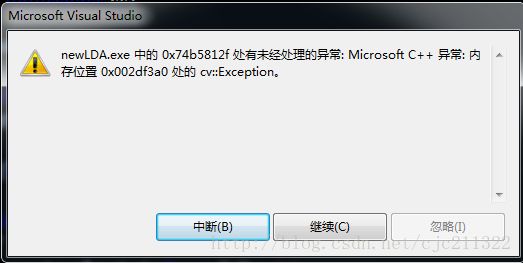OpenCV访问Mat对象中数据时发生异常---Mat中的数据访问
至于OpenCV中Mat中的数据如何访问,详见http://blog.csdn.net/yang_xian521/article/details/7161335,这里有普通青年、文艺青年、暴力青年的说法。
常见问题,上代码:
// newLDA.cpp : 定义控制台应用程序的入口点。
//
/*#include "stdafx.h"
#include <cxcore.hpp>
#include <vector>
#include <iostream>
#include "lda.h"
using namespace std;
using namespace cv;
int main(void)
{
double data[6][2]={{0,1},{0,2},{1,4},{8,0},{8,2},{9,4}};
Mat dmat=Mat(6,2,CV_64FC1,data);
int labels[6]={0, 0, 0, 1, 1, 1};
Mat lmat=Mat(1,6,CV_32SC1,labels);
//---------------------------------------------------------------
for(int i=0;i<dmat.rows;i++)
{
for(int j=0;j<dmat.cols;j++)
{
cout<<dmat.ptr<double>(i)[j]<<" ";
}
cout<<endl;
}
cout<<"--------------------------------"<<endl;
Mat envalue;
Mat envector;
int classNum=2;
MyLDA(dmat, lmat);
system("pause");
return 0;
}*/
#include "stdafx.h"
#include <cxcore.hpp>
#include <iostream>
using namespace std;
using namespace cv;
int main(void)
{
double data[2][2]={{1.0,2.0},{3.0,4.0}};
Mat dmat=Mat(2,2,CV_64FC1,data);
for(int i=0;i<dmat.rows;i++)
{
for(int j=0;j<dmat.cols;j++)
{
cout<<dmat.at<float>(i,j)<<" ";
}
cout<<endl;
}
system("pause");
return 0;
}

将
cout<<dmat.at<float>(i,j)<<" ";改为
cout<<dmat.at<double>(i,j)<<" ";

可见当矩阵类型为CV_64FC1时,Mat::at()会执行类型检查。
但是
#include "stdafx.h"
#include <cxcore.hpp>
#include <iostream>
using namespace std;
using namespace cv;
int main(void)
{
float data[2][2]={{1.0,2.0},{3.0,4.0}};
Mat dmat=Mat(2,2,CV_32FC1,data);
for(int i=0;i<dmat.rows;i++)
{
for(int j=0;j<dmat.cols;j++)
{
cout<<dmat.at<int>(i,j)<<" ";
}
cout<<endl;
}
system("pause");
return 0;
}
可见此时只是读取的结果不正确,但是并没有发生异常
把
cout<<dmat.at<int>(i,j)<<" ";改为
cout<<dmat.at<double>(i,j)<<" ";发生异常
故当矩阵为其他类型时(不是CV_64FC1),只要读取时使用的类型小于原数据的存储类型,就不会发生异常。
读取时的类型匹配至关重要。
